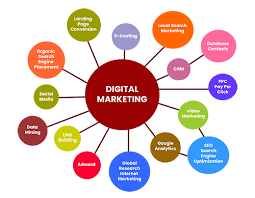The Power of SEO and Content Marketing
In the digital age, where information is abundant and attention spans are short, standing out from the crowd is crucial for businesses. This is where SEO (Search Engine Optimization) and content marketing come into play as powerful tools to enhance online visibility and engage with target audiences effectively.
SEO: Enhancing Visibility
SEO is the practice of optimizing a website to rank higher in search engine results pages (SERPs). By strategically incorporating relevant keywords, improving site speed, enhancing user experience, and building quality backlinks, businesses can increase their organic traffic and reach a wider audience.
Effective SEO not only boosts visibility but also establishes credibility and trust with users. When a website appears at the top of search results for relevant queries, it signals to users that the content is authoritative and valuable, leading to increased click-through rates and conversions.
Content Marketing: Engaging Audiences
Content marketing focuses on creating and distributing valuable, relevant content to attract and retain a clearly defined audience. By producing high-quality articles, blog posts, videos, infographics, and more, businesses can connect with their target customers on a deeper level and drive engagement.
When combined with SEO best practices, content marketing becomes even more potent. By aligning content creation with keyword research and user intent, businesses can ensure that their content not only resonates with audiences but also ranks well in search engines. This synergy between SEO and content marketing leads to improved brand visibility, increased website traffic, and enhanced brand loyalty.
The Synergy Between SEO and Content Marketing
SEO and content marketing are not standalone strategies but rather complementary forces that work together to achieve common goals. While SEO enhances visibility by improving technical aspects of a website, content marketing enriches user experience by providing valuable information that educates or entertains audiences.
By integrating keyword-optimised content into a well-structured website that prioritises user engagement, businesses can create a virtuous cycle of attracting visitors through search engines, engaging them with compelling content, and ultimately converting them into loyal customers.
In Conclusion
In today’s competitive digital landscape, leveraging the power of SEO and content marketing is essential for businesses looking to thrive online. By combining strategic SEO tactics with engaging content creation efforts, businesses can enhance their online presence, drive organic traffic growth, and build lasting relationships with their target audiences.
Exploring the Synergy: 17 Common Questions on SEO and Content Marketing
- How does content marketing impact SEO?
- How to combine SEO and content marketing?
- What are examples of SEO marketing?
- Why is content marketing good for SEO?
- What is an example of SEO?
- Is content marketing part of SEO?
- Does content marketing include SEO?
- What are the 4 pillars of content marketing?
- What are the 7 steps of content marketing?
- Why SEO and content marketing?
- How do you integrate content marketing and SEO?
- What are the 3 types of SEO?
- How does content marketing help with SEO?
- How is SEO used in marketing?
- Is content marketing the same as SEO?
- How does content marketing affect SEO?
- Does SEO help with content marketing?
How does content marketing impact SEO?
Content marketing plays a pivotal role in influencing SEO performance. By creating high-quality, relevant content that aligns with users’ search intent and incorporates strategic keywords, businesses can significantly impact their SEO rankings. Engaging and informative content not only attracts organic traffic but also encourages backlinks from reputable sources, which are crucial for enhancing a website’s authority in the eyes of search engines. Furthermore, by regularly publishing fresh content that resonates with target audiences, businesses can improve user engagement metrics such as dwell time and click-through rates, signalling to search engines that the website provides valuable information worth ranking higher in search results. In essence, content marketing acts as the driving force behind SEO success by providing the fuel that propels websites to the top of search engine results pages.
How to combine SEO and content marketing?
Combining SEO and content marketing is essential for maximising online visibility and audience engagement. To seamlessly integrate these two strategies, businesses should start by conducting thorough keyword research to identify relevant terms and topics that align with their target audience’s search intent. By incorporating these keywords strategically into high-quality, informative content such as blog posts, articles, and videos, businesses can not only attract organic traffic but also improve their search engine rankings. Additionally, focusing on creating valuable content that addresses the needs and interests of the target audience while adhering to SEO best practices like meta tags, internal linking, and mobile responsiveness can further enhance the synergy between SEO and content marketing, resulting in a powerful digital marketing strategy that drives results.
What are examples of SEO marketing?
In the realm of SEO marketing, there are various strategies and techniques that businesses employ to enhance their online visibility and attract organic traffic. Some common examples of SEO marketing include keyword research and optimisation, on-page SEO practices such as meta tags and headings, link building to improve domain authority, content creation tailored to target keywords, local SEO for geographically targeted searches, and technical SEO enhancements like site speed optimisation and mobile responsiveness. These tactics work in tandem to improve a website’s search engine ranking and drive qualified traffic, ultimately contributing to a successful SEO marketing campaign.
Why is content marketing good for SEO?
Content marketing plays a pivotal role in enhancing SEO performance due to its ability to provide valuable, relevant, and engaging content that aligns with user intent. Search engines like Google prioritise high-quality content that satisfies user queries and provides meaningful information. By creating well-crafted content that incorporates targeted keywords, businesses can improve their website’s visibility in search engine results pages (SERPs) and attract organic traffic. Additionally, content marketing encourages link building and social sharing, both of which are essential factors in boosting a website’s authority and credibility in the eyes of search engines. Ultimately, the synergy between content marketing and SEO not only improves a website’s ranking but also enhances user experience, driving long-term success in the digital landscape.
What is an example of SEO?
An example of SEO (Search Engine Optimization) is when a website owner conducts keyword research to identify relevant terms and phrases that their target audience is searching for online. By strategically incorporating these keywords into the website’s content, meta tags, and headings, the site becomes more likely to rank higher in search engine results pages (SERPs) for those specific queries. This practice helps increase the website’s visibility and organic traffic, ultimately improving its chances of attracting qualified leads and potential customers.
Is content marketing part of SEO?
In the realm of digital marketing, the relationship between content marketing and SEO is often a topic of discussion. While distinct in their strategies and objectives, content marketing is undeniably intertwined with SEO. Content creation plays a pivotal role in SEO efforts by providing valuable, keyword-optimised material that not only engages audiences but also enhances a website’s visibility in search engine results. In essence, effective content marketing serves as a cornerstone of successful SEO practices, contributing to improved rankings, increased organic traffic, and overall online presence.
Does content marketing include SEO?
When considering the relationship between content marketing and SEO, it is important to understand that while content marketing and SEO are distinct strategies, they are closely intertwined. Content marketing focuses on creating valuable and engaging content to attract and retain audiences, while SEO involves optimising this content for search engines to improve visibility and ranking. In essence, content marketing provides the substance and relevance that SEO algorithms look for when determining search rankings. Therefore, while content marketing does not inherently include SEO, the two strategies work hand in hand to drive organic traffic, enhance online visibility, and ultimately achieve digital marketing success.
What are the 4 pillars of content marketing?
When it comes to content marketing, understanding the four pillars is essential for creating a successful strategy. The 4 pillars of content marketing encompass creation, distribution, promotion, and analysis. Firstly, creation involves developing high-quality and relevant content that resonates with the target audience. Distribution focuses on reaching the right audience through various channels such as social media, email, and websites. Promotion entails actively promoting the content to increase visibility and engagement. Lastly, analysis involves measuring the performance of the content to refine strategies and improve future campaigns. By embracing these four pillars, businesses can effectively leverage content marketing to drive engagement and achieve their marketing goals.
What are the 7 steps of content marketing?
When it comes to content marketing, understanding the fundamental steps can be key to crafting a successful strategy. The 7 steps of content marketing provide a structured approach to creating and distributing valuable content that resonates with target audiences. These steps typically include defining goals and target audience, conducting research and keyword analysis, planning content creation, implementing SEO best practices, promoting content through various channels, measuring performance and adjusting strategies based on data insights. By following these systematic steps, businesses can effectively engage with their audience, enhance brand visibility, and drive meaningful results in the competitive digital landscape.
Why SEO and content marketing?
In the realm of digital marketing, the question of “Why SEO and content marketing?” frequently arises due to their symbiotic relationship and undeniable impact on online success. SEO (Search Engine Optimization) is essential for enhancing visibility and driving organic traffic by optimising websites for search engine algorithms. On the other hand, content marketing focuses on creating valuable, engaging content to attract and retain audiences. Together, SEO and content marketing form a powerful duo that not only boosts search engine rankings but also cultivates meaningful connections with target customers. By combining the technical prowess of SEO with the storytelling prowess of content marketing, businesses can elevate their online presence, increase brand awareness, and ultimately drive conversions in a competitive digital landscape.
How do you integrate content marketing and SEO?
Integrating content marketing and SEO involves aligning the creation of valuable, audience-centric content with strategic search engine optimisation techniques. To achieve this synergy, businesses should conduct thorough keyword research to understand what topics and phrases their target audience is searching for. By incorporating these keywords naturally into high-quality content such as blog posts, articles, videos, and infographics, businesses can not only attract organic traffic but also engage and inform their audience effectively. Additionally, optimising on-page elements like meta tags, headings, and internal links can further enhance the visibility and relevance of the content in search engine results pages. Ultimately, successful integration of content marketing and SEO requires a holistic approach that prioritises user experience, relevance, and search engine visibility to drive sustainable growth and engagement.
What are the 3 types of SEO?
When exploring the realm of SEO, it is common to encounter the question: “What are the 3 types of SEO?” The three main types of SEO are on-page SEO, off-page SEO, and technical SEO. On-page SEO focuses on optimizing individual web pages to improve their search engine rankings and attract organic traffic. Off-page SEO involves activities conducted outside of the website to enhance its authority and relevance in the eyes of search engines. Technical SEO deals with the backend elements of a website, such as site speed, mobile-friendliness, and structured data markup, to ensure optimal performance and indexability. Understanding these three types of SEO is essential for implementing a comprehensive strategy that boosts online visibility and drives sustainable growth.
How does content marketing help with SEO?
Content marketing plays a crucial role in enhancing SEO by providing valuable and relevant content that aligns with user intent and search engine algorithms. When businesses create high-quality content that incorporates targeted keywords, addresses user queries, and offers insightful information, they not only engage their audience but also improve their website’s visibility in search engine results pages. Search engines reward websites that offer valuable content by ranking them higher, leading to increased organic traffic and improved search engine rankings. In essence, content marketing acts as a catalyst for SEO success by driving user engagement, building authority, and optimising the overall online presence of a business.
How is SEO used in marketing?
In the realm of marketing, SEO plays a pivotal role in enhancing visibility and driving organic traffic to websites. By strategically incorporating relevant keywords, optimizing website structure and content, and building quality backlinks, businesses can improve their search engine rankings and attract a wider audience. SEO ensures that a company’s online presence aligns with the search intent of users, making it easier for potential customers to discover their products or services. Ultimately, by effectively utilising SEO techniques in marketing strategies, businesses can increase brand awareness, generate leads, and achieve long-term success in the digital landscape.
Is content marketing the same as SEO?
When exploring the realm of digital marketing, a common query that often arises is whether content marketing is synonymous with SEO. While both disciplines are interconnected and mutually beneficial, they serve distinct purposes in the online landscape. Content marketing revolves around creating and distributing valuable content to engage and inform target audiences, aiming to drive brand awareness and customer loyalty. On the other hand, SEO focuses on optimising website visibility and ranking on search engine results pages through strategic keyword usage, technical enhancements, and link building. While content marketing contributes to SEO by providing relevant material for search engines to index, SEO ensures that this content is discoverable by enhancing its visibility online. Ultimately, while closely related, content marketing and SEO play unique roles in a comprehensive digital marketing strategy.
How does content marketing affect SEO?
When considering the relationship between content marketing and SEO, it is essential to recognise the significant impact that content has on search engine optimisation. Content marketing plays a pivotal role in enhancing SEO by providing search engines with valuable, relevant, and high-quality content to index and rank. Well-crafted content that incorporates strategic keywords, addresses user intent, and encourages engagement not only attracts organic traffic but also signals to search engines the credibility and authority of a website. In essence, content marketing acts as the fuel that drives SEO success, influencing factors such as website visibility, ranking positions, and overall online presence.
Does SEO help with content marketing?
The relationship between SEO and content marketing is symbiotic, with each strategy complementing and enhancing the other. SEO plays a crucial role in content marketing by ensuring that high-quality content is discoverable by search engines and reaches its intended audience. By incorporating relevant keywords, optimizing meta tags, and improving site structure, SEO helps to increase the visibility and ranking of content in search engine results pages. Ultimately, effective SEO not only drives organic traffic to content but also enhances its overall reach and impact, making it an indispensable ally to successful content marketing efforts.




